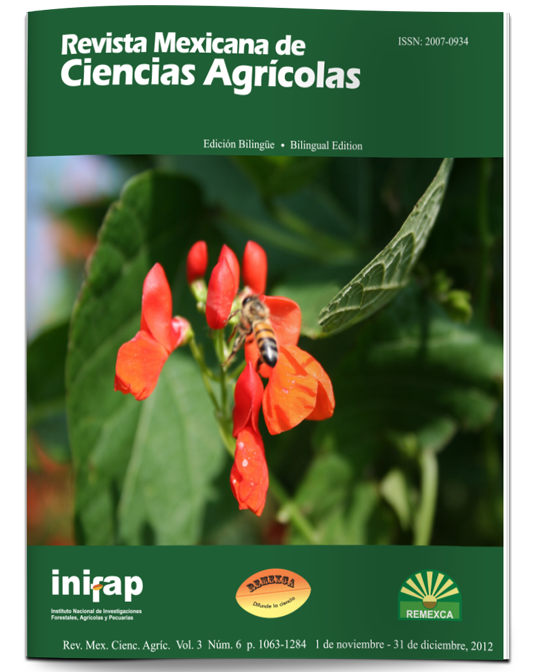Competitiveness, efficiency and environmental impact of the production of beans (Phaseolus vulgaris L.) on Zacatecas, Mexico
DOI:
https://doi.org/10.29312/remexca.v3i6.1371Keywords:
Phaseolus vulgaris L., analysis matrix of expanded policy, production systemsAbstract
In the early nineties in Mexico began a series of programs to assist the competitiveness of rural producers face the withdrawal of state support for production, trade and services sector as well as their incorporation in the process of trade liberalization. Zacatecas is the largest producer of beans (Phaseolus vulgaris L.) national. Most of the production is rainfed. Low rainfall, low efficiency in agricultural irrigation and overexploitation of aquifers causes environmental damage. The objective of this study was to evaluate the impact of the agricultural policy in bean production systems in the state of Zacatecas through the determination of competitive production technologies and efficient, considering the market failures related to the environment. Were determined the indicators of competitiveness and efficiency through the implementation of the extended policy analysis matrix (EPAM). The research was conducted with data from spring-summer cycle 2009. The framework of analysis was the rural district of development in Zacatecas, Fresnillo, Río Grande and Ojocaliente. With the exception of TCS technologies from the RDD Zacatecas, Ojocaliente, BCF and TCS, all production systems shown to be competitive in the current situation. Cultivated production systems with competing technologies also showed to be efficient, except TCSL Fresnillo and Ojocaliente BMF. The adoption of sustainable practices will reduce the deterioration in competitiveness and efficiency of production systems.
Downloads
Downloads
Published
How to Cite
Issue
Section
License
The authors who publish in Revista Mexicana de Ciencias Agrícolas accept the following conditions:
In accordance with copyright laws, Revista Mexicana de Ciencias Agrícolas recognizes and respects the authors’ moral right and ownership of property rights which will be transferred to the journal for dissemination in open access. Invariably, all the authors have to sign a letter of transfer of property rights and of originality of the article to Instituto Nacional de Investigaciones Forestales, Agrícolas y Pecuarias (INIFAP) [National Institute of Forestry, Agricultural and Livestock Research]. The author(s) must pay a fee for the reception of articles before proceeding to editorial review.
All the texts published by Revista Mexicana de Ciencias Agrícolas —with no exception— are distributed under a Creative Commons License Attribution-NonCommercial 4.0 International (CC BY-NC 4.0), which allows third parties to use the publication as long as the work’s authorship and its first publication in this journal are mentioned.
The author(s) can enter into independent and additional contractual agreements for the nonexclusive distribution of the version of the article published in Revista Mexicana de Ciencias Agrícolas (for example include it into an institutional repository or publish it in a book) as long as it is clearly and explicitly indicated that the work was published for the first time in Revista Mexicana de Ciencias Agrícolas.
For all the above, the authors shall send the Letter-transfer of Property Rights for the first publication duly filled in and signed by the author(s). This form must be sent as a PDF file to: revista_atm@yahoo.com.mx; cienciasagricola@inifap.gob.mx; remexca2017@gmail.
This work is licensed under a Creative Commons Attribution-Noncommercial 4.0 International license.



